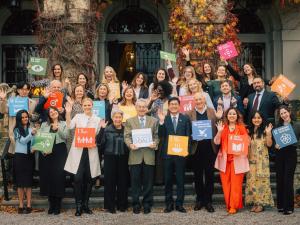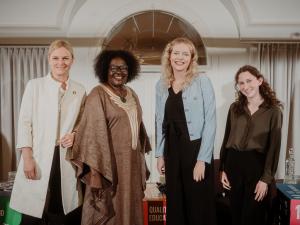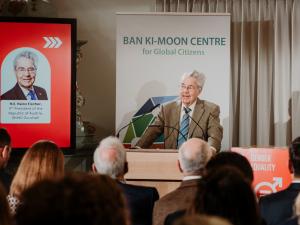International Forum on Global Citizenship Education Shapes the Future of Learning Beyond 2030
In the presence of Dr. Heinz Fischer, Former President of the Republic of Austria, the third International Forum on Education took place in Salzburg.
SALZBURG, SALZBURG, AUSTRIA, November 3, 2025 /EINPresswire.com/ -- With just five years remaining in the United Nations’ 2030 Agenda for Sustainable Development, the International Forum on Education for the Post-2030 Agenda took place on October 30, 2025, at Schloss Leopoldskron. Hosted by the Foreign Ministry of the Republic of Korea, the Ban Ki-moon Centre for Global Citizens (BKMC), and Salzburg Global, the Forum reimagined education’s role in addressing 21st-century global risks and systemic challenges.Dr. Heinz Fischer, 11th Federal President of the Republic of Austria and Co-chair of the BKMC: “Education can and should therefore be understood in its widest possible sense – as something that is connected to every single element of the Sustainable Development Goals. It relates to social justice and the empowerment of those who are likely to be left behind. It also, however, relates to the urgent questions of our environment. And, finally, it relates – perhaps more than ever – to the prevention of war and violence, to the respect for human rights, human life and for democracy.”
H.E. Ham Sang Wook, Permanent Representative of the Republic of Korea to the International Organizations in Vienna: “The Republic of Korea’s commitment to GCED is rooted in our own history. We rose from the ashes of the Korean War just over seventy years ago to become a thriving democracy, an economic powerhouse and a cultural hub. All this was possible with the help of international commitment and education.”
H.E. Ban Ki-moon, 8th Secretary-General of the United Nations and Co-chair of the BKMC: “As the international community begins to reflect soon on the post-2030 Agenda, I have several wishes. (…) I hope that the next UN Secretary-General appointed will be a woman, bringing fresh leadership to embody the principles of equality, inclusion and solidarity.”
Katrin Kohl, Co-Chair, UNESCO Chair in Reorienting Education towards Sustainability: “As we may not be able to reach Sustainable Development, (…) in one generation, we need to transform the education systems to become inclusive and relevant. We need to increase our capacity to meet those challenges. (…)”
The Forum brought together educators, youth leaders, policymakers, civil society, and private sector actors to discuss how education can drive inclusive, sustainable change and shape the post-2030 global education agenda. Central to the convening, was that soon the international community prepares for key milestones such as the 2027 UNESCO Global Education Meeting. The Forum called for renewed commitment to place Global Citizenship Education at the heart of the post-2030 global education agenda, ensuring its continued relevance, integration, and investment in learning systems worldwide.
The first panel, “Education for a Complex Future,” explored how education can equip learners and societies to anticipate and respond to emerging global risks. Panelists discussed strategies to support educators and empower youth amid rapid technological and social change, while addressing persistent gaps in equity, quality, and relevance as the world looks beyond 2030. They also reflected on the importance of embracing pluralism, diversity, and inclusion within knowledge and learning systems. The session featured distinguished speakers, including Amanda Abrom, Director of the Global Schools Program at the United Nations Sustainable Development Solutions Network, Prof. Catherine Alum Odora Hoppers, Canadian Research Chair in Pluralistic Societies, Transdisciplinarity, Cognitive Justice and Education at the University of Calgary and Katharina Reisenbauer, Austrian Youth Delegate to the United Nations, moderated by BKMC CEO Monika Froehler.
The Forum also marked the launch of BKMC’s Policy Recommendations Paper “The Case for Green Jobs”. Drawing on the BKMC’s changemakers’ voices of the “Your Future in Green Jobs” Program, supported by Dubai Cares, Plan International and Unbounded Associates, the paper argues that equipping young people with green skills and providing them with access to green jobs is vital to combating the climate crisis and building a sustainable, inclusive economy. It calls on governments, educators, business leaders, and civil society to work together - aligning policy, education, and opportunity - to make every job a green job.
Through a series of breakout sessions, participants explored pressing global risks - including misinformation, climate risk, conflict and fragility, and societal disruption. They examined each through the lens of global citizenship education and discussed how learning can equip individuals and communities to respond effectively.
The second panel, “Future Opportunities & Transformation,” explored shared strategies for shaping a long-term vision for education. Panelists discussed how collective action, innovation, and collaboration can drive systemic transformation to ensure that education remains adaptive, inclusive, and impactful amid global change. The session featured distinguished speakers, including Kehkashan Basu, M.S.M., Founder-President of the Green Hope Foundation and recipient of Canada’s Meritorious Service Medal, Gloria Figueroa Ortiz, General Director, San José de Las Vegas School in Medellín, Colombia and initiator of the Medellín Challenge, Mario Vasilescu, CEO & Co-Founder of Readocracy, Dominic Regester, Director of Education and Director of the Center for Education Transformation at Salzburg Global. They shared forward-looking solutions and partnerships essential for reimagining learning systems that can meet the needs of future generations.
Through dialogue, collaboration, and shared vision, participants explored innovative pathways to strengthen education’s power to foster peace, resilience, and global solidarity.
The International Forum served as a significant milestone in advancing the post-2030 education agenda. It emphasized the importance of making education systems future-proof, equitable, and responsive to the evolving needs of learners and societies worldwide. It underscored a shared commitment to ensuring that education remains a catalyst for sustainable development, innovation, and global cooperation in the years ahead. The BKMC and its partners remain committed to making progress in this critical area.
To watch the recording, visit the BKMC’s YouTube channel: https://www.youtube.com/watch?v=d6u0tq-5O9s
Katharina Choe
Ban Ki-moon Centre for Global Citizens
+43 664 9163287
email us here
Visit us on social media:
LinkedIn
Instagram
Facebook
YouTube
TikTok
X
Legal Disclaimer:
EIN Presswire provides this news content "as is" without warranty of any kind. We do not accept any responsibility or liability for the accuracy, content, images, videos, licenses, completeness, legality, or reliability of the information contained in this article. If you have any complaints or copyright issues related to this article, kindly contact the author above.



